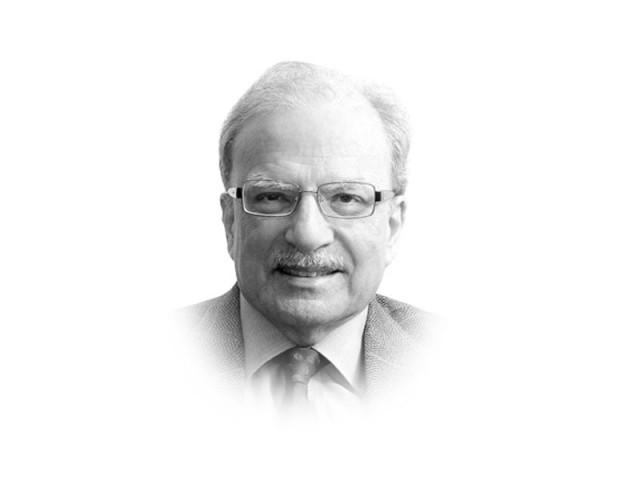Trump’s trip to East Asia
The visit will take Trump to five East Asian countries — China, Japan, the Philippines, South Korea and Vietnam

The writer is a former caretaker finance minister and served as vice-president at the World Bank
The American president is focusing on the wrong issue; what should interest him and his advisers are two other developments that would be of a greater consequence for the United States’ presence in Asia than the North Korean problem. In fact American policymakers should be greatly concerned with the rise of China and Japan. In so far as the first is concerned, the United States has not been able to formulate a position concerning China it can pursue at international forums. As for the second, it is not certain whether Washington has fully understood the way things are shaping up in Tokyo.
The visit will take Trump to five East Asian countries — China, Japan, the Philippines, South Korea and Vietnam. By the time he leaves for Honolulu, Hawaii, where he will visit Pearl Harbor and would be briefed by the US Pacific Command, he would have been in office for almost 10 months. This will be his third foreign visit. The first took him to Saudi Arabia in May. There, in the presence of 50 heads of Muslim states, he enlisted the help of the Kingdom in the fight against Islamic extremism aided, he believes, by Iran.
The second trip came soon after when he went to Europe where he gave a public address in which he began to lay down the elements of what foreign experts have begun to call the Trump doctrine. This was at Warsaw, the capital of Poland, the country that had taken a decisive turn to the right and therefore offered a welcoming audience for the American president’s evolving views about the global order. He spoke about the building war between the “West and the Rest.” Perhaps drawing inspiration from Samuel P Huntington’s seminal work, The Clash of Civilizations, Trump implored the Christian West to gather the will to fight and overcome the threat posed by extremist Islam.
It is worth noting that none of the countries Trump is visiting in Asia during this trip is a Muslim-majority nation. His antipathy towards Islam did not let up even after he had vented his anger at the religion and its followers at Warsaw. For instance, Trump jumped into the fray when it was reported that the UK’s crime rate had surged 13 per cent in one year, making London a more violent place than New York. He linked the rise in serious crime in London to the “spread of radical Islam.” This drew a sharp rebuke from Ed Miliband, the former head of the Labour Party. Miliband wrote on Twitter: “Spreading lies about your own country: sad. Spreading lies about others: sadder.” He called the American president an “absolute moron” as critics dismissed the president’s comments as “ignorant” and “divisive”.
At the time Trump is going to East Asia, his administration is engaged in difficult negotiations with Canada and Mexico in an attempt to rewrite the Clinton-era North America Free Trade Agreement. Trump is suspicious of all multilateral trade deals in which he believes that his country gave more than it received. On his Asia visit, he will take up the issue of trade agreements with Japan and South Korea, as even about the bilateral arrangements in place Trump is convinced disadvantaged the United States.
This visit will not take him to any of the countries in South Asia. Trump seems to believe that his August 21st speech that laid down his country’s policy towards Afghanistan spelled out clearly what Washington wished to accomplish in the subcontinent. India was to partner with the United States in managing the area Trump calls Indo-Pacific. New Delhi was also asked to use some of its enormous surplus in the India-US trade to rebuild the Afghan economy. Pakistan, on the other hand, is seen as the spoiler. Islamabad was told to stop providing sanctuaries to the radical groups fighting Kabul’s army as well as the forces of the United States that were aiding the Afghan troops. If Islamabad did not play ball, it could expect to be punished.
Washington did not quite spell out what Trump was hoping to achieve during his trip to five East Asian nations. In Beijing, Trump will meet President Xi Jinping who had won the full support of the Communist Party in the organisation’s 19th five-year meeting. Not only had the party conference given Xi another five-year term in office, it had also endorsed the various programmes the president had launched. Most ambitious of these was the Belt and Road Initiative on which Beijing will spend more than a trillion dollars in five dozen countries to connect them better through both land and sea routes with China.
This should be a sobering visit for Donald Trump. It will send him a strong message that the dominant role once the United States enjoyed is no longer there. Some of this downgrading was inevitable with China’s rise and, simultaneously, a more assertive Japan. But that is not the only reason. The way Donald Trump is managing the United States’ approach to the world is also playing an important role.
Published in The Express Tribune, October 30th, 2017.
Like Opinion & Editorial on Facebook, follow @ETOpEd on Twitter to receive all updates on all our daily pieces.















COMMENTS
Comments are moderated and generally will be posted if they are on-topic and not abusive.
For more information, please see our Comments FAQ